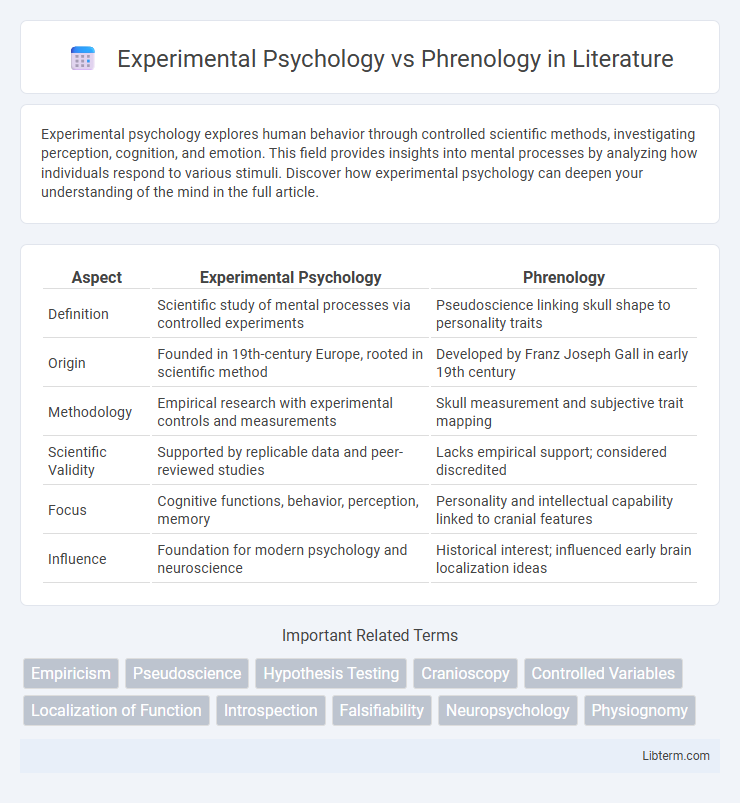Experimental psychology explores human behavior through controlled scientific methods, investigating perception, cognition, and emotion. This field provides insights into mental processes by analyzing how individuals respond to various stimuli. Discover how experimental psychology can deepen your understanding of the mind in the full article.
Table of Comparison
| Aspect | Experimental Psychology | Phrenology |
|---|---|---|
| Definition | Scientific study of mental processes via controlled experiments | Pseudoscience linking skull shape to personality traits |
| Origin | Founded in 19th-century Europe, rooted in scientific method | Developed by Franz Joseph Gall in early 19th century |
| Methodology | Empirical research with experimental controls and measurements | Skull measurement and subjective trait mapping |
| Scientific Validity | Supported by replicable data and peer-reviewed studies | Lacks empirical support; considered discredited |
| Focus | Cognitive functions, behavior, perception, memory | Personality and intellectual capability linked to cranial features |
| Influence | Foundation for modern psychology and neuroscience | Historical interest; influenced early brain localization ideas |
Introduction to Experimental Psychology and Phrenology
Experimental psychology utilizes empirical methods and controlled experiments to study cognitive processes, behavior, and physiological responses, establishing a scientific basis for understanding the mind. Phrenology, an early pseudoscience, claimed that personality traits and mental faculties could be determined by the shape and bumps of the skull, lacking empirical support and reproducibility. The systematic approach of experimental psychology contrasts sharply with phrenology's speculative nature, marking a significant evolution in the scientific study of human behavior.
Historical Origins and Development
Experimental psychology originated in the late 19th century with Wilhelm Wundt's establishment of the first laboratory in 1879, emphasizing systematic observation and measurement of mental processes. Phrenology, developed earlier in the early 19th century by Franz Joseph Gall, proposed that skull shapes reflected personality traits, but lacked empirical support and was later discredited. The scientific rigor and methodological approaches of experimental psychology led to its foundation as a respected discipline, contrasting with phrenology's pseudoscientific status.
Core Principles of Experimental Psychology
Experimental psychology is grounded in empirical research, using controlled experiments to study cognitive processes, behavior, and neural mechanisms, emphasizing measurement, observation, and hypothesis testing. Unlike phrenology, which relies on the discredited concept of skull shape predicting personality traits, experimental psychology prioritizes scientific methods and replicable results. Core principles include operational definitions, random assignment, and statistical analysis to objectively understand mental functions and behavior.
Foundational Beliefs of Phrenology
Phrenology, founded in the early 19th century by Franz Joseph Gall, posits that the brain is the organ of the mind and that specific mental faculties are localized in precise regions of the cerebral cortex. Its foundational belief is that the shape and size of various parts of the skull reflect the development of underlying brain areas, which correspond to distinct personality traits and intellectual abilities. Experimental psychology, grounded in empirical methods and controlled experimentation, rejects phrenology's reliance on skull morphology, emphasizing observable behavior and neurological evidence over speculative cranial measurements.
Scientific Methodology: Experimentation vs. Observation
Experimental psychology relies heavily on systematic experimentation involving controlled variables and reproducible conditions to understand mental processes, providing empirical evidence through hypothesis testing and data analysis. Phrenology, in contrast, is based largely on observational methods that interpret the shape and bumps of the skull to infer personality traits, lacking rigorous experimental validation and often criticized for its subjective and anecdotal approach. The scientific methodology of experimental psychology prioritizes objective measurement and falsifiability, setting it apart from the observational and non-empirical framework of phrenology.
Major Figures and Contributors
Experimental psychology is shaped by major figures like Wilhelm Wundt, who founded the first psychological laboratory in 1879, and William James, a pioneering American psychologist known for his work on functionalism. In contrast, phrenology, popularized by Franz Joseph Gall in the early 19th century, asserted that personality traits could be inferred from skull shape, with contributions from Johann Spurzheim who helped spread its influence. Experimental psychology relies on scientific methods and empirical research, while phrenology lacks empirical support and is considered a pseudoscience.
Applications and Influence on Psychology
Experimental psychology advances scientific methods to explore cognitive processes, behavior, and perception, influencing modern clinical practices, educational strategies, and neuropsychological research. Phrenology, once popular in the 19th century, falsely claimed that skull shape indicated mental traits, impacting early psychological thought but ultimately discredited for lack of empirical support. While phrenology contributed to the initial interest in brain localization, experimental psychology's rigorous approach has shaped evidence-based treatments and psychological assessment tools used today.
Criticisms and Controversies
Experimental psychology is criticized for sometimes neglecting ecological validity due to controlled laboratory settings, which may limit the generalizability of its findings. Phrenology faced widespread controversy and rejection because it lacks empirical support and scientific methodology, relying on the disproven idea that skull shape determines personality traits. While experimental psychology continues to evolve through rigorous scientific methods, phrenology is largely condemned as a pseudoscience with no credible evidence.
Impact on Modern Psychological Science
Experimental psychology fundamentally transformed modern psychological science by emphasizing empirical methods and controlled experimentation to understand cognitive processes, behavior, and perception. Phrenology, once considered a scientific approach based on skull morphology to infer personality traits, was discredited but indirectly spurred interest in localized brain functions. The rigorous methodologies developed in experimental psychology continue to underpin contemporary research, shaping fields such as cognitive neuroscience and behavioral therapy.
Conclusion: Lessons from History
Experimental psychology relies on empirical research and scientific methods to understand human behavior and cognition, while phrenology, based on skull measurements, is now discredited due to its pseudoscientific foundations. The historical contrast teaches the importance of rigorous empirical validation and falsifiability in psychological theories. This lesson underscores the necessity for continuous methodological advancements to ensure reliability and validity in psychological science.
Experimental Psychology Infographic

 libterm.com
libterm.com